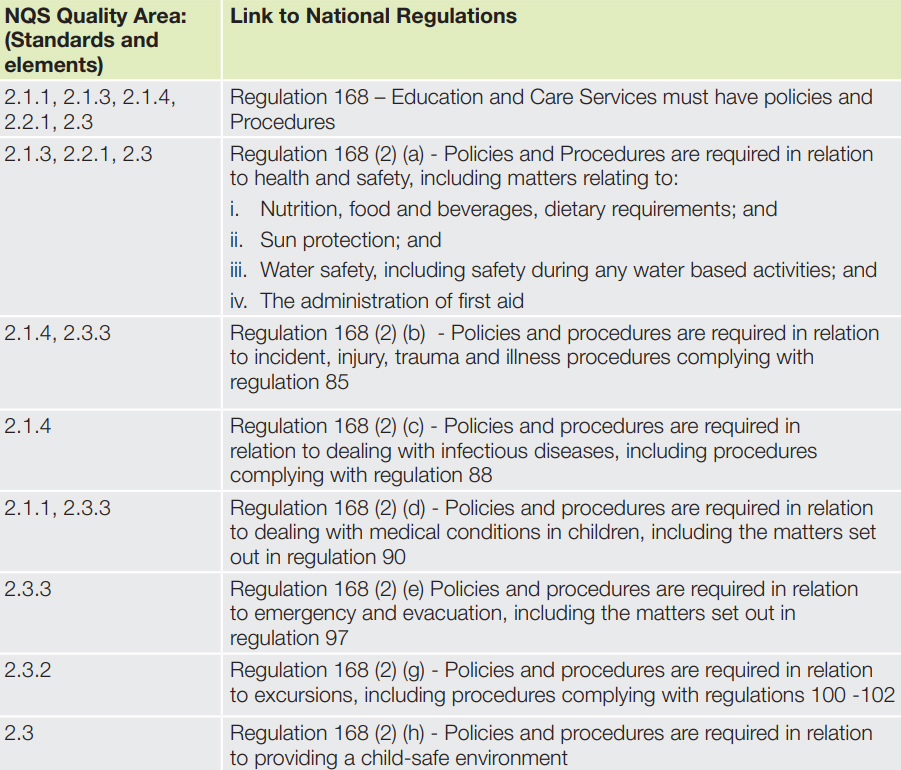Policies are an important part of an early childhood setting. They are a legal requirement that identifies and minimise risks of various tasks and responsibilities demonstrated by Educators and provide information for families of how situations are handled.
Meeting Legal Requirements
ACECQA outlines the minimum policies required by Early Childhood Services to comply with legislation and to meet the requirements of each quality areas of the National Quality Framework. Services may have more or fewer policies and procedures based on the community, needs of the families and children and the context of the service.
Minimum Policies Required

Developing Policies
When developing Policies, there are many considerations that need to be considered including:
- Legal Requirments - under the national quality framework
- Service Philosophy
- Stakeholder involvement - including Educators, Directors, families, children, community members etc.
- Equity and inclusion
- Current research and contemporary best practices
Policies should include:
- Policy title
- Policy statement or statement of intent. It could also include policy objective and aim.
- Policy (procedures, how policy is implemented etc).
- Links to the regulation.
- Sources (websites, books, journal articles, used as references when developing the policy- should be cited).
- Version - date endorsed e.g. the date the policy was approved, the date for review etc.
Note:
- Use recommended sources to develop and review policies. Ensure that you have a clear understanding of the National Regulations and Law, NQS requirements for your service etc.
- Keep up to date with best practice through the latest research, attending professional developmental workshops, understanding current trends etc.
- When developing policies, it's also important to include Parents and Stakeholders. Have conversations, send out feedback and suggestion forms, have an interactive information parent board up in the foyer, include information in parent emails, newsletters and information sessions.
Implementing Effective Policies
Once you have developed your policy, you need to implement it to test that it is effective such as:
- Choose 2 or 3 draft policies
- Apply the policy to a practical scenario and see if the procedures are realistic within the environment.
- Reflect on the usefulness of the policy.
- Identify the strengths and weaknesses of the policy.
- Consider risk management and protocols.
- Asess who will implement the policy and if it is understood by them.
- Change or update the policy when necessary.
When the policy is implemented effectively, it's important for Educators to know and understand the services policies and procedures, put them into practice and effectively communicate with families.
Policies should be available for both Parents and Educators and readily accessible through the Parent Handbook and Staff Handbook.
For more information on What is a Policy, What is a Procedure, Why they are Important, Required Policies and more, please read the following: Regulations On Policies and Procedures In Early Childhood
References:
- Policies and Procedures, Good Start Early Learning
- Policies and Procedures, Early Childhood Education and Care, QLD Government
- Policies and Procedures, University Of Canberra.
- How To Develop and Update Policies, Professional Support Co-Ordinator, Australian Government, December 2012







 As an Educator in Australia, your pay rate falls under the Children’s Services Award 2010. This award states the minimum amount that an employer can
As an Educator in Australia, your pay rate falls under the Children’s Services Award 2010. This award states the minimum amount that an employer can When working as a qualified Early Childhood Teacher (with a university degree) within a service, your rate of pay will come from the Educational Services
When working as a qualified Early Childhood Teacher (with a university degree) within a service, your rate of pay will come from the Educational Services When working as a Diploma Qualified Educator your pay rate is from the Children's Services Award 2010. This Award states your minimum rate of pay
When working as a Diploma Qualified Educator your pay rate is from the Children's Services Award 2010. This Award states your minimum rate of pay When working as a Cert 3 Qualified Educator, your pay rate is from the Children's Services Award 2010. This Award states your minimum rate of
When working as a Cert 3 Qualified Educator, your pay rate is from the Children's Services Award 2010. This Award states your minimum rate of Educational Leaders play a crucial role in their early childhood service by ensuring that the educational program aligns with best practices and supports the holistic
Educational Leaders play a crucial role in their early childhood service by ensuring that the educational program aligns with best practices and supports the holistic In early childhood education and care, ratios are more than a technicality—they are a frontline safeguard. Every child deserves responsive supervision, emotional connection, and developmental
In early childhood education and care, ratios are more than a technicality—they are a frontline safeguard. Every child deserves responsive supervision, emotional connection, and developmental With the new national child safety reforms kicking in on 1 September 2025, early childhood services like yours have a real opportunity to lead the
With the new national child safety reforms kicking in on 1 September 2025, early childhood services like yours have a real opportunity to lead the Here’s a comprehensive Mobile Phone and Smart Watch Policy tailored for early childhood education and care (ECEC) services in Australia, aligned with the latest 2025
Here’s a comprehensive Mobile Phone and Smart Watch Policy tailored for early childhood education and care (ECEC) services in Australia, aligned with the latest 2025 The Sea of Fish Challenge is a national initiative that invites children, educators, families, and communities to create and display fish artworks as a symbol
The Sea of Fish Challenge is a national initiative that invites children, educators, families, and communities to create and display fish artworks as a symbol Across the early childhood education and care sector, educators are sounding the alarm: current staffing ratios are insufficient to deliver safe, meaningful, and developmentally appropriate
Across the early childhood education and care sector, educators are sounding the alarm: current staffing ratios are insufficient to deliver safe, meaningful, and developmentally appropriate


